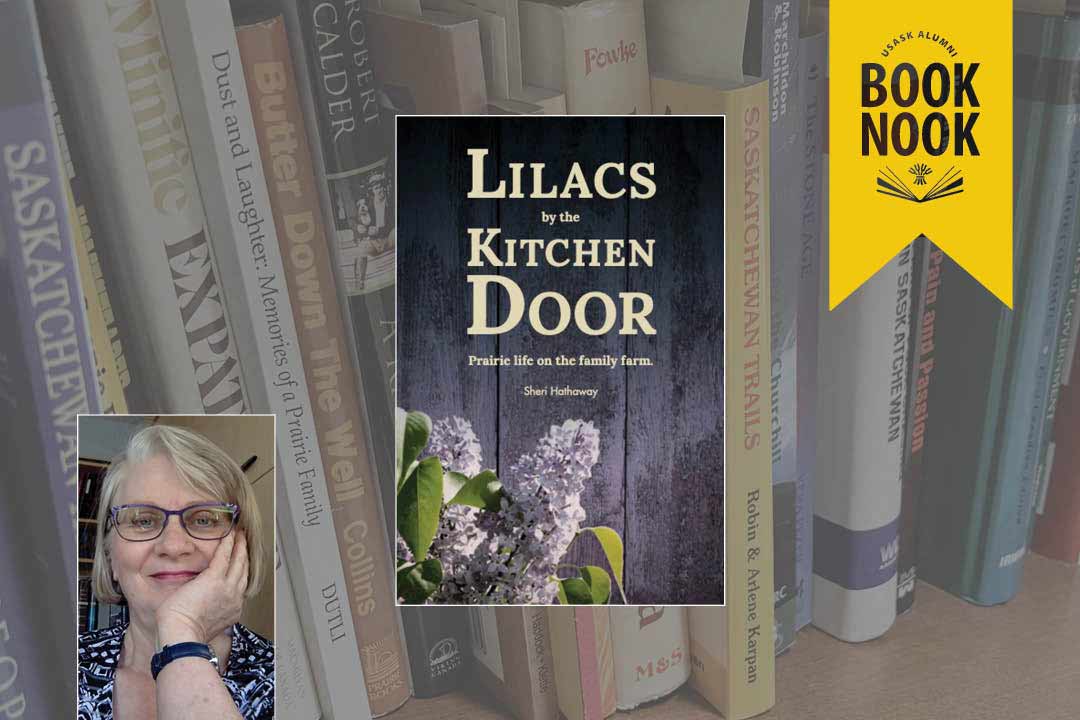
Alumni Book Nook: Sheri Hathaway (BEd’97)
Sheri Hathaway is the author of "Lilacs by the Kitchen Door", which focuses on Prairie life on the family farm
University of Saskatchewan (USask) graduate Sheri Hathaway focuses on farm life from the perspective of a child in the 20th century in her latest book, Lilacs by the Kitchen Door. The Saskatoon writer and former teacher, who studied in the College of Education, also looks back on life before the digital age in the non-fiction book, which was published by Welcome Home Publishing in September 2023. Previously, Hathaway wrote a book of poetry called 2 Women 2 Generations 26 Poems. She is now retired and is pursuing writing on a full-time basis.
What have you been doing since you graduated from USask?
After graduating, I did some substitute teaching in Saskatoon and area for about three years until I obtained a full-time teaching position in Alberta. Later I came back to Saskatoon, where I pursued different occupations while writing part-time.
Your book looks at the experiences of members of your family. Why did you choose that topic?
I started writing farm history articles for The Western Producer using my father and grandfathers as main characters. I like to add a personal touch to make any article more interesting. While writing about those farm memories, other memories came to mind that weren’t farm related—family and community events. Having lived a very different life than my parents, I realized just how many tragedies they encountered and how hard their lives were compared to mine. They had told us kids some stories about their lives, but not all—and, while doing research, I began to realize the full narrative. As I thought about those events, I realized how different their experiences were to most people’s lives today. I gathered all my articles together and added in the personal family stories. The book became a collection of history, biographies, a personal memoir—and, in places where I knew an event happened but didn’t know the facts, I imagined how it probably happened based on my knowledge of the people involved, thus becoming creative non-fiction, too.
What inspired the title of the book?
The book had many titles while I was putting it together. When my daughter, Melissa, read it, she suggested Lilacs by the Kitchen Door. I created a survey on Facebook suggesting that one and a few other titles. Lilacs won the most votes. It’s not only picturesque but also represents the beauty that our pioneers created out of hardship—the tough but beautiful shrub that some planted in memory of a lost loved one or planted just to give themselves some beauty in a harsh environment, which then thrived and bloomed on the austere prairie despite adversity. Those plants represent the resilient people who planted them.
What was it like to write this book?
The history bits were interesting to research because I love history. The happy family stories were a joy to write. The sad parts were heart-wrenching. I’d be sitting at my computer with tears streaming down my face. In the end, though, it was good to look at those lives from an objective view. Today, I have a greater understanding of their behaviours and, as I described in the book, I can now forgive. It was good for me to write it and I hope it helps others gain a better understanding of some things that happened to them.
Did your education at USask play a role in researching and/or writing this book? If so, how?
I’ve always loved doing research and writing. My USask classes taught me the breadth of sources available as well as the distinct differences in culture in the many people who gather to study there.
What response have you received from readers?
I recently read parts of the book at a seniors’ residence. Having lived through things like using an old crank telephone on a party line, or riding in a Model A, they loved hearing my stories about that part of their lives now passed. I only read some of the happy stories since I knew I wouldn’t get through the sad bits on stage. Many people in this area are from farm backgrounds and are interested in the farm stories. Many have come from tough family situations and can relate to those parts. Others are interested in the historical accounts. It appeals to many for different reasons.


